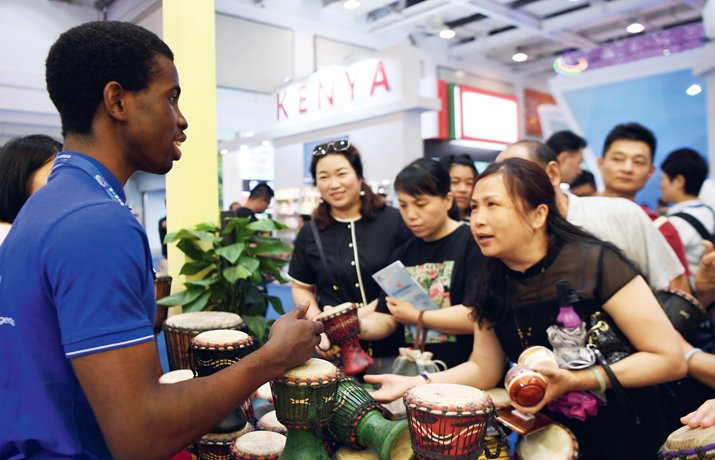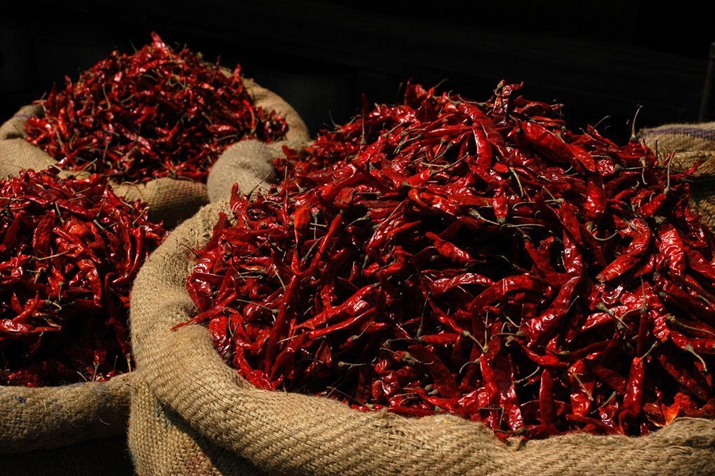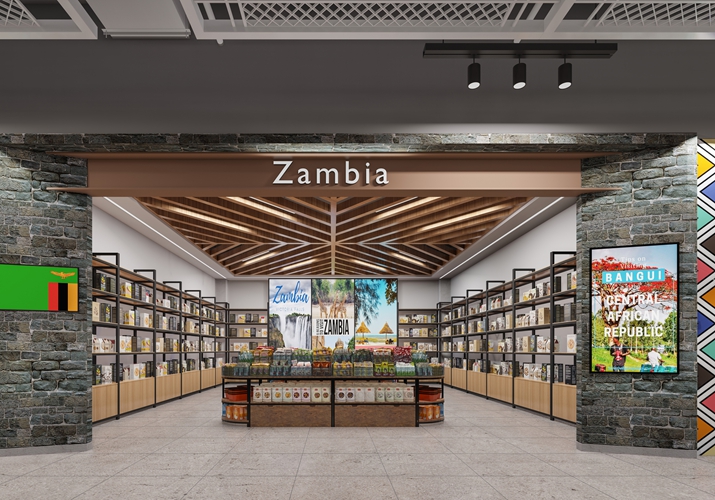|
||||||||||
| Home Nation World Business Opinion Lifestyle ChinAfrica Multimedia Columnists Documents Special Reports |
|
||||||||||
| Home Nation World Business Opinion Lifestyle ChinAfrica Multimedia Columnists Documents Special Reports |
| Current Cover Story |
| Hunan gears up to maximize business opportunities at the Second CAETE |
| Since the launch of the pilot zone, Hunan has made promoting China-Africa cooperation a top priority of the province and is pooling resources province-wide for the purpose |
| By Hu Fan VOL. 13 SEPTEMBER 2021 ·2021-08-30 |

A Ghanaian exhibitor promotes tambourines to visitors at the first CAETE on June 28, 2019
With the theme New Start, New Opportunities and New Achievement, the Second China-Africa Economic and Trade Expo (CAETE) will be held from September 26 to 29 in Changsha, Hunan Province, the permanent venue of the biennial event.
The event will include 12 themed forums and economic cooperation talks highlighting key and emerging areas in China-Africa cooperation, such as food and agricultural products, health and medicine, infrastructure, and industrial chains.
Exhibitions will be held in the Changsha International Convention & Exhibition Center, as well as in the Gaoqiao Grand Market, China's third-largest wholesale market. Algeria, Ethiopia, Kenya, Rwanda, South Africa and Senegal will be the guests of honor at this year's event, while Chinese provinces of Zhejiang and Jiangxi will be specially featured in these exhibitions.
To counteract the impact of the ongoing COVID-19 pandemic, the expo will be held online and offline simultaneously. Guests who are not in China will be invited to attend the opening ceremony and some of the forums via video links. Online exhibitions will also be available.
Mbelwa Kairuki, Tanzanian Ambassador to China, is among the diplomats invited to the expo in person. He regrets that visits by African businesses, an important target group of the expo, are hampered due to the pandemic and the event is unlikely to be as bustling as the first edition. However, he believes it is important to continue the mechanism for win-win cooperation between China and Africa. "It is important that we keep the momentum, keep the ball rolling," he told ChinAfrica.
The growing China-Africa cooperation is an important reason why Hunan Province has determined to continue the biennial expo despite the pandemic, according to Shen Yumou, Deputy Executive General Secretary of the Secretariat of the CAETE Organizing Committee and Secretary of the Leading Party Members' Group of the Hunan Provincial Department of Commerce. China-Africa cooperation was hit hard by the pandemic at its early stage in 2020, but saw strong recovery as the situation turned better.
"The recovery has shown the resilience and vitality of China-Africa cooperation and the strong need for expanded cooperation between Chinese and African businesses. It has given us confidence in holding this expo," Shen told ChinAfrica.

The Gaoqiao Grand Market
All-out support
As the main organizer of the expo, Hunan has spared no effort in ensuring success of the event. The provincial government has held multiple promotion meetings in important cities across the country such as Beijing and Guangzhou, and added a new facility, Changsha International Conference Center, for the expo.
The government is laying even greater emphasis on the impact of the expo after it is over. In the Gaoqiao Grand Market located in Yuhua District of Changsha, the branch venue of the expo, new initiatives are in place for that purpose.
The market has over 8,000 venders trading over 1.7 million kinds of commodities. Earlier this year, the China-Africa Economic and Trade Cooperation Promotion Innovation Demonstration Park started operation in the market and is now home to about 200 companies focusing on China-Africa trade.
At this expo, the market will officially launch permanent country-specific exhibition halls that will showcase African countries and African brands, highlighting a selection of industries and products from African countries. Currently, the setting up of exhibition halls for eight African countries, including Ethiopia, Kenya and Zambia, has been authorized by their respective embassies in China.
Aware of the importance of branding in promoting African products that are not yet well known in China, the market has started an initiative to incubate African brands. At this expo, the market will include 100 branded African products, including 60 for coffee, 30 for nuts and 10 for other agricultural products.
Livestreaming as a popular way of promoting products will also be leveraged. During the expo, the market will launch the first livestreaming festival for African products at the China-Africa E-commerce Livestreaming Incubator, a facility set specially for promoting African products. Some 62 livestreaming activities are planned during the expo, which will invite online celebrities, multi-channel network operators and African students in China to promote sales of African products on major e-commerce platforms.
During the expo, the market will open its online and offline sales system to African products, and will mobilize the merchants settled in the markets to invite purchasers from across the country. "We estimate that over 100,000 purchasers will be involved during the expo," said Liu Yajuan, Vice President of the market.

Rwandan dry chili
Tangible benefits
For James Kimonyo, Rwandan Ambassador to China, one recent piece of good news is the arrival of 200 kg of Rwandan dry chili in Hunan Province on August 4. It was the first time China imported this produce from any African country.
Kimonyo attributed the success to the first CAETE in 2019, where preliminary deals were reached between Chinese and Rwandan companies, which involved the supply of 50,000 tons of dry chili to the Chinese market over a span of five years.
After the deals were signed, the Rwandan Government made a request to export this produce to China. Due to its nature as a plant-derived product subject to strict customs requirements, dry chili was previously only imported by China, the world's biggest consumer of spicy food, from seven countries.
Hunan's local customs responded proactively to clear the way for this Rwandan specialty. With careful examination including an on-site inspection, Rwandan dry chili became the first non-resource African product Hunan has helped to access the Chinese market.
With the second CAETE on its way, Kimonyo is determined to take the chance to present more Rwandan products. He attended a promotion conference for the expo held in Guangzhou on July 29 and delivered a speech, in which he expressed the resolute support of African countries to the expo. To him, the expo is an optimal place for African businesses to forge partnerships and sign deals with Chinese business leaders.
"When you have secured a contract or deal there, you have given the opportunity to business people from your country and people who work on every single day to produce those products like coffee and chili," he told ChinAfrica.

The design scheme of the permanent exhibition hall of Zambia
Hunan ambition
Hunan's plan for its role in China-Africa interactions goes way beyond being the permanent venue for the expo. It has put forward initiatives to build itself into a pioneering center for innovative mechanisms for China-Africa economic cooperation.
In September 2020, Hunan's plan to build a pilot free trade zone in the province was approved, and the Pilot Zone for In-depth China-Africa Economic and Trade Cooperation was launched as a part of the plan.
The pilot zone involves the construction of centers for importing, processing and distributing African non-resource products such as coffee, nuts and cocoa. These include the trade center in the demonstration park in the Gaoqiao Grand Market and other centers in Changsha and other cities of the province.
Apart from Rwandan dry chili that has accessed the Chinese market, the centers are also helping bring in other African produce, such as anchovy from Kenya, beef from Uganda and lamb from Madagascar.
Other projects under construction include a logistics and human resources hub, centers for the promotion of and research on economic cooperation and trade with Africa, and a cross-border renminbi center that will allow trading in the Chinese currency.
Since the launch of the pilot zone, Hunan has made promoting China-Africa cooperation a top priority of the province and is pooling resources province-wide for the purpose. Industrial parks and other facilities focusing on China-Africa economic cooperation and trade are being built in cities like Shaoyang, Yueyang and Liuyang. In the industrial park in Yueyang established earlier this year, imports of African products such as mica, natural rubber and timber reached 740 million yuan ($114 million) in the first half of the year.
The province is now aiming higher. "The expo is expected to serve as a window for the whole country and Africa to know about the pilot zone and attract resources related to Africa across the country to Hunan," Shen said.
(Print Edition Title: A Springboard For Broader Engagement)
Comments to hufan@chinafrica.cn
| About Us | Contact Us | Advertise with Us | Subscribe |
| Copyright Beijing Review All rights reserved 京ICP备08005356号-5 京公网安备110102005860号 |